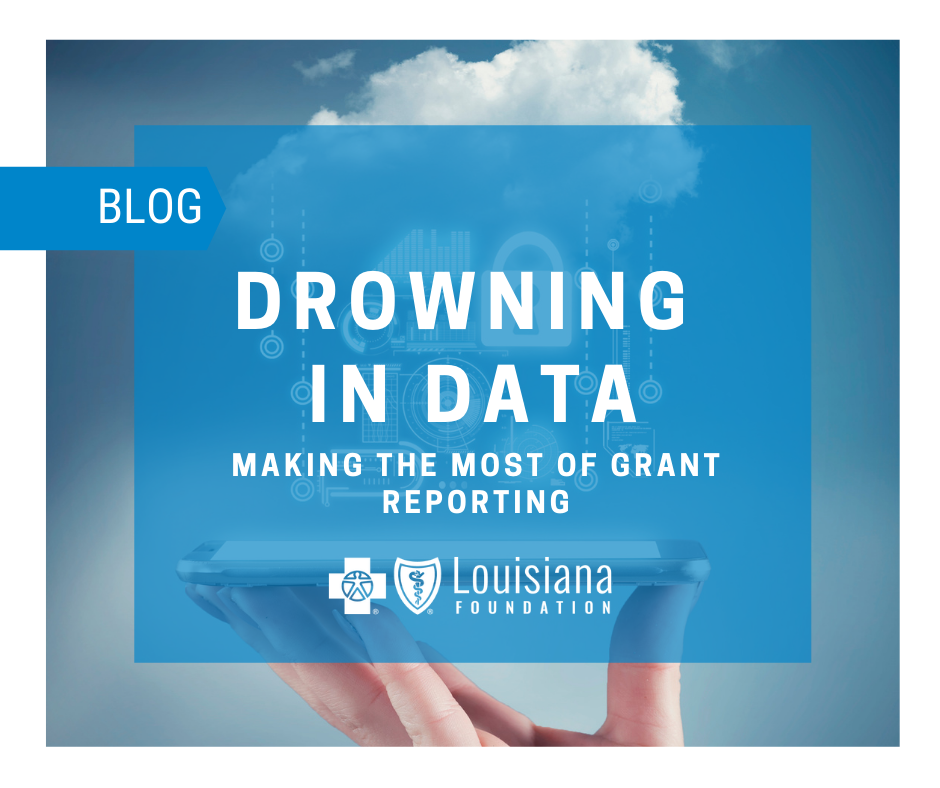Part 1: Tips From the Field
Managing grant awards can be time-consuming and frustrating, especially for leaders working in small organizations doing big work, where each staff person wears lots of hats.
As a former nonprofit leader, I remember being most frustrated by reporting requirements. You get a new grant, celebrate for a hot minute, and quickly have a thousand new deadlines and to-dos added to the pile.
I took lessons from that time into my current role as I tried to improve our Foundation’s reporting requirements. I believe that while funders need to have a clear picture of which partners are on track with project goals, reporting should add meaning and value to all parties involved. (But I do know that isn’t always the case!)
Having now worked on both sides of this equation (grant-seeker and grant-maker), I’m sharing a few best practices I’ve picked up from some organizations the Blue Cross Foundation has funded — and who have excelled at reporting as a tool for learning, connecting and collaborating. These tips will hopefully shed some light on how to make reporting easier and more effective.
Find the Right Fit From the Get
Many of the most successful grant-getting organizations I’ve seen follow one die-hard rule: before you even think about putting pen to paper, ensure that your organization and the funder are in alignment. Don’t try to force a match.
It is important to get crystal clear on the funder’s strategic priorities so as not to waste your time or commit to things that are not within the mission of your organization. When considering a funder, reflect on:
- What have they funded in the past?
- What initiatives are they interested in funding?
- What types of grants do they offer (start-up, capital, general operating, ongoing programmatic funding, project based, planning, etc.)
- What are they looking for? Sometimes you can find or ask for the scoring rubric to get a better picture.
- Does this match with what we do/want to do?
Also, think about your return on investment – is what we are putting into the grant worth what we will get out of it? Does your organization have the capacity to execute the grant with high quality? You can inquire about the reporting requirements on the front end of the process to figure out how well and easily your team can meet them.
It’s a Team Effort
Sometimes the person that gets or writes the grant is not in charge of executing or managing it. It’s important for the grant writer to engage the team that will be involved in the execution from the very beginning.
Other helpful tips for the team:
- Ask whether you can meet the grant requirements without additional stress or risk of burnout.
- Collaborate to create shared ownership of what the most important reporting data are.
- Create a shared grant calendar so everyone has visibility to all reporting deadlines
- Ask funders for reporting documents up front and upload into a document sharing system (google docs, one drive, etc). This way updates/data can be entered on an ongoing basis vs. the day its due
- Calendar time to enter project updates for reporting requirements on an ongoing basis
Begin with the end in mind
Once awarded, spend some time refining your grant goals to ensure they are meaningful, measurable, and achievable. Sometimes they may need to be adjusted. Make sure the team is clear on:
- What are we aiming to achieve?
- What information will assess progress?
Typically, this is what matters most to funders when reporting progress. When I check in with grantees, we spend most of our time reviewing key progress indicators for each project benchmark. Honestly, it’s OK if grant partners are off track when we check in. The data can help us collaborate around potential solutions or adjust timelines or goals as needed.
Figure out what matters most to report out to funders and create a shared system to collect data from the start. We partnered with UpMetrics to make it easier for our partners to share data with us – collection is streamlined and we get easy-to-read dashboards. If you’re applying for a grant, consider adding capacity support like UpMetrics to your budget.
In the second part of this post, I’m going to share some practices I’ve learned from great organizations about how a mindset shift can change how we see reporting. I’ll also pull back the curtain on what the staff of funding organizations are doing with your data and reports.
With gratitude,
Chloé Wiley
Initiatives Manager, Blue Cross and Blue Shield of Louisiana Foundation
chloe.wiley@bcbsla.com
Subscribe to our mailing list
